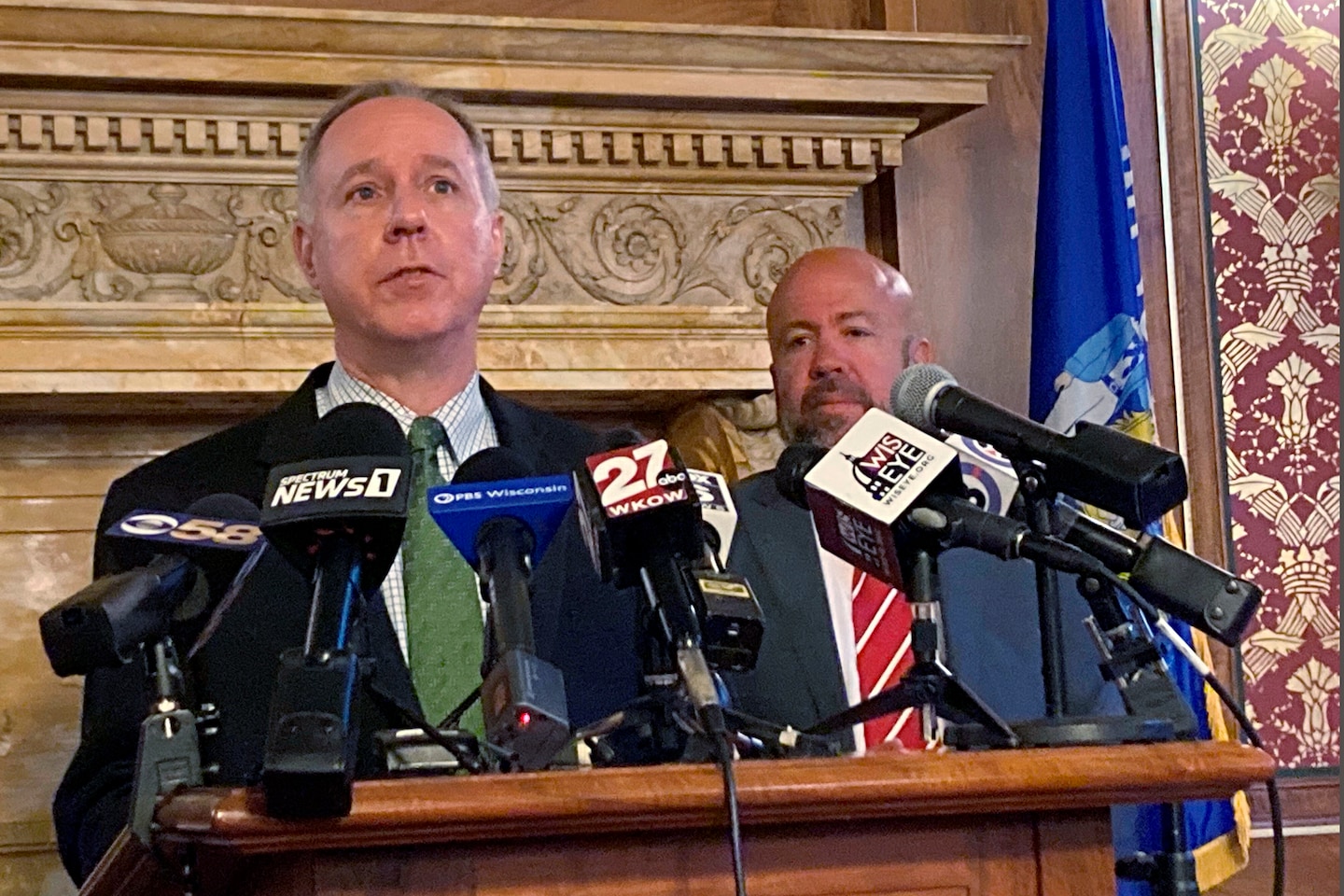Wisconsin anti-voting-fraud activist commits voter fraud to make a point

“I would be willing to take that hit for the country,” Wait said of facing jail time. “You can’t have ballots going all over the place, unsecured.”
“I committed a crime when I did it,” he said, “but do you think criminals care when they do it?”
Wait said he used the state’s online elections portal Tuesday to request absentee ballots for the Aug. 9 primary to be sent to his home in the names of Assembly Speaker Robin Vos (R) and Racine Mayor Cory Mason (D). Wait has clashed with both of the officials repeatedly as the president of the group HOT Government, which takes its name from an acronym for “honest, open and transparent.”
Soon after he made the requests, Wait explained his actions in an email to Vos and Mason as well as Racine County District Attorney Patricia Hanson (R) and Racine County Sheriff Christopher Schmaling (R), who has promoted former president Donald Trump’s claims of voter fraud and called for the arrest of five of the state’s elections commissioners.
Wait said he and others requested about a dozen ballots in all. Other than the requests for ballots for Vos and Mason, Wait said he had permission from the voters to request their ballots. He said he had not received ballots for Vos and Mason and did not expect to because he had alerted authorities to what he had done.
Hanson said she was investigating the matter. Under Wisconsin law, it’s a misdemeanor to make a false statement to obtain a ballot and a felony to make a false statement to an election clerk.
In a Facebook post about the incident, Schmaling made no mention of investigating Wait — and instead called for an investigation of the state’s online elections portal, MyVote Wisconsin.
Ann Jacobs, who sits on the state’s elections commission, said the district attorney should charge anyone involved in the effort to try to get ballots meant for others.
“They intentionally went and stole somebody’s ballot,” said Jacobs, a Democrat on a board that is politically evenly divided. “It’s like walking into Walmart and picking up a large-screen TV and walking out the door with it and then going to the cops and saying, ‘It’s really easy to steal this.’ You still stole it.”
Jacobs and the commission’s nonpartisan director, Meagan Wolfe, said the attempts to illegally obtain ballots did not expose any vulnerabilities in the state’s system.
“Intentionally using someone else’s identity to subvert the system does not demonstrate a flaw with MyVote, but rather a flaw with that person’s conduct,” Wolfe said in a written statement. “A nefarious person who chooses to impersonate someone else to gain official documents of any kind — whether for election use or any other purpose — is clearly violating state and federal law and could face consequences.”
The issue prompted the elections commission to call for an emergency meeting Thursday night.
Vos issued a statement decrying Wait’s move and noting that Wait is supporting Vos’s primary opponent.
“His actions are sad,” Vos said in his statement. “If election integrity means anything, it means we all have to follow the law — Republicans and Democrats alike.”
Mason said he wants Wait to face charges.
“He’s clearly violated the law and tried to take away my right to vote, as well as Robin’s,” he said. “You can argue that there should be more security at the local bank. You can’t go rob the bank to make your point.”
Mason said he’s worried Wait’s actions will drum up unfounded suspicions about voter fraud just before the fall elections.
“It’s clearly wrong and, you know, laced with all kinds of irony of people so desperate to prove a conspiracy that doesn’t exist that they’re willing to perform the very crime they claim they’re trying to prevent,” he said.
Wisconsin’s online portal allows registered voters to request absentee ballots after logging in using their names and dates of birth. They can have the ballots sent anywhere so that those who are temporarily living somewhere other than their homes have a chance to vote.
A similar procedure can be followed by sending in a paper form through the mail.
Most voters must provide a copy of a photo ID the first time they request an absentee ballot that the election clerk can keep on file. Voters who say they are confined to their home because of age or disability do not have to show an ID, but falsely making such a claim is a crime.
When voters make online requests for ballots, their clerk receives an email informing them of the request. The clerk makes the final call on whether to issue ballots.
Wait said he recently explained to a reporter with the conservative Epoch Times how to request an absentee ballot in Wait’s name and have it mailed to Michigan. A short time later, he received a call from his clerk to alert him to the request, he said.
Wait said the system worked in that instance, but he was worried clerks in other parts of the state would not be as diligent.
“I want MyVote shut down,” Wait said. “I want all absentee ballots shut down until they can secure the ballots.”
Wait made his ballot requests two weeks before the primary, when Vos faces a challenge from Adam Steen. The primary will also narrow the field for governor and U.S. Senate.
Wait, who backs Steen, has long fought with Vos over the 2020 presidential election. Joe Biden beat Trump by about 21,000 votes in Wisconsin — results that have been upheld by courts and independent reviews.
Wait said he does not believe Vos has done enough to look into the election even though Vos hired a former state Supreme Court justice to conduct a year-long investigation of it.
Schmaling last year called for Jacobs and four other elections commissioners to be charged with crimes for the policies they set for voting in nursing homes in 2020. Because nursing homes weren’t allowing visitors during the coronavirus pandemic, the elections commission told clerks to disregard a law that required them to send poll workers to those facilities and instead send residents absentee ballots.
Hanson and two other district attorneys declined to charge the commissioners. Two other prosecutors have not said whether they plan to bring charges over that matter.
Schmaling did not return a call Thursday, but Wait said the sheriff told him he did not plan to arrest him during a call they had Wednesday.
“He said, ‘Thank you so much for breaking this open,’ ” Wait said of his talk with Schmaling. “So I said, ‘Does that mean you’re not going to arrest me?’ And he said, ‘hell, no.’ ”
That same morning, Schmaling posted a message on Facebook that said, “I am disheartened by the apparent vulnerabilities in My Vote Wisconsin that are ripe for fraud, and everyone — no matter their political leanings — should join in requesting a thorough, statewide, investigation into this significant election integrity issue.”
As of Thursday afternoon, the post had generated hundreds of comments and had been shared nearly 1,000 times.


